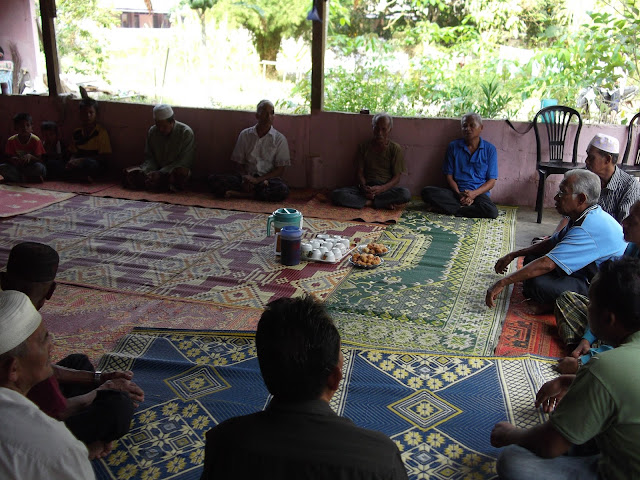I've been wanting to get a better taste of how the average Balinese family lives, and I got my opportunity after inquiring at the guesthouse where my mom and I had been staying. I was invited to stay with one of the guesthouse's employees, 19-year-old Desi, and her family. They live in Keliki village, about 15 minutes from Ubud by motorbike. Despite not speaking too much English, her and her family were extremely welcoming right from the beginning. The ice was broken with a teaching of cat's cradle.
 |
| Desi (left) with sisters/cousins Seepi, Yuna and Ronnie |
Desi lives in a typical Balinese family compound, shared by two families. There are two structures for sleeping (one for each family), one for guests (where I stayed), two kitchens, two bathrooms, one place with a bed where the dead are put, and of course, a family temple.
 |
| Guest Room |
 |
| Entrance to the Family Temple |
 |
| Inside their Temple |
Their home is complete with two dogs, three rabbits, many chickens, and many pigs of various sizes.
 |
| One of the largest pigs |
Desi went to work at the guesthouse early in the morning, so I spent the day with her cousin Yuna, also 19 years old. She is a painter of Hindu goddesses.
Yuna showed me how she makes the paintings and even gave me one (travel size, conveniently). It is Saraswati, the goddess of knowledge. I am thankful I will have Saraswati by my side during my quest for knowledge in the coming year.
After some painting, Yuna's friend, Listu, came over to hang out with us. She spoke quite good English, and explained that she has family members who are English teachers. They suggested that we go to a nearby river to take a "traditional bath." The walk down to the river was beautiful.
The river was very low, more streamlike, and there were spigots for bathing or collecting water. This is the main source of water for the villagers, and they said that it comes from the mountains and is clean and pure. (Nevertheless Desi still bought bottled water for me as soon as I arrived at her house.) The three of us changed into sarongs and bathed in the water, it was very refreshing.
 |
| Villagers gathering water, Listu and Yuna on the right |
It was a special day for the family temple, so in the evening we performed a ceremony that happens once every 50 days. Offerings of fruit, rice and flowers were placed on each of the pillars (for lack of a better word) in the family temple. An aunt said the necessary prayer to give the offerings, but other that that it was just Desi (who ran the show), Yuna, Seepi, Ronnie and I doing the ceremony (which made me curious, since there are many other people in the family). We were donned in sarongs and sashes, with hair pulled back, but long sleeves were not necessary.
 |
| Offerings prepared to be given to the gods |
After the offerings had been given, we took off our flip flops and kneeled down on them. We cleaned our hands with flowers. Three times we prayed (silently) with flowers between our fingers, palms flat together, thumbs touching the nose or forehead. The first time, flower went behind the right ear, second time, flowers put in the hair, third time, just put on the ground.
Then, Desi got up, blessed holy water with incense at one of the pillars, and came round to each of us in turn. First, she sprinkled holy water onto us using a special flower. Next, we drink the water three times. Lastly, we put the water in our hair. Followed by holy rice. Some to the forehead, some to the divet in the front of the neck, three grains to eat, and the rest in the hair.
 |
| Yuna, me, Desi, Ronnie |
 |
| Me, Seepi, Ronnie |
The next morning, I arose at 6 am and went went back to Ubud with Desi. With only two days left in Indonesia, it was time to get all of my ducks in a row before heading to a new location.




























































